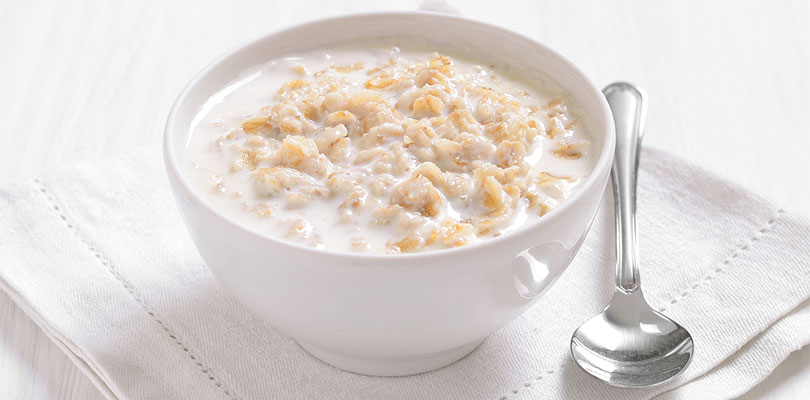
17 best foods that can help with GERD
Gastroesophageal reflux disease (GERD) is a common digestive disorder affecting millions. It occurs when stomach acid flows back into the esophagus, causing symptoms like heartburn, regurgitation, and discomfort. While there are a lot of treatment options that can help manage GERD, making changes in food intake is a crucial part of symptom management. Here are the top 17 foods that can help one manage GERD while enjoying a delicious and satisfying meal.
Oatmeal
Oatmeal is an excellent choice for a GERD-friendly breakfast. It’s a low-fat, high-fiber food that helps absorb excess stomach acid and soothe the esophagus. The high fiber content of oatmeal also aids in regulating bowel movements, reducing the risk of abdominal pressure that can contribute to acid reflux. To make oatmeal even more GERD-friendly, avoid adding high-fat toppings like butter, which can relax the lower esophageal sphincter (LES) and worsen reflux symptoms. Instead, sweeten it naturally with a ripe banana or a drizzle of honey.
Ginger
Ginger is a natural anti-inflammatory agent that can be particularly helpful for individuals with GERD. Its soothing properties can alleviate symptoms such as heartburn and discomfort. One can incorporate ginger into their food regimen by making ginger tea, adding it as a spice to the dishes, or even enjoying ginger candies.
Lean protein
Choosing suitable protein sources is crucial for managing GERD. Lean proteins like skinless chicken, turkey, and fish are less likely to trigger acid reflux than fatty meat cuts like beef or pork. When preparing these proteins, opt for grilling, baking, or broiling instead of frying, as frying can add excess fat that may lead to discomfort.
Non-citrus fruits
Citrus fruits are unfavorable for people with GERD due to their acidic nature. However, non-citrus options like bananas, apples, and melons are gentle on the stomach and unlikely to cause acid reflux. These fruits are safe for GERD and rich in vitamins, antioxidants, and fiber, promoting overall digestive health.
Whole grains
Whole grains like brown rice, quinoa, and whole wheat bread are excellent alternatives to refined grains for individuals with GERD. They are high in fiber, which aids in digestion and helps prevent stomach acid from flowing back into the esophagus. These grains are versatile and can be used in various dishes, from salads to side dishes and main courses.
Almonds
Almonds are a heart-healthy snack that can also help neutralize stomach acid. They are an excellent choice for individuals with GERD seeking a satisfying and nutritious snack. Almonds can be enjoyed as a small handful or used as a topping, adding flavor and texture to the meal.
Green vegetables
Green vegetables like spinach, kale, and broccoli are nutrient powerhouses. They are high in vitamins and antioxidants, supporting overall digestive health. Incorporating these vegetables into the meals can provide essential nutrients while minimizing the risk of acid reflux.
Aloe vera juice
Aloe vera juice is known for its soothing properties, making it an excellent choice for GERD symptom relief. It can reduce inflammation in the esophagus caused by acid reflux. For best results, consume a small amount of aloe vera juice before meals to help create a protective barrier in the stomach and esophagus.
Fennel
Fennel is a natural remedy used for centuries to alleviate digestive discomfort. Both fennel seeds and fresh fennel bulbs can help ease GERD symptoms. Chewing on fennel seeds after meals can aid digestion and reduce the risk of acid reflux. Additionally, sliced fennel into salads can add a refreshing and flavorful twist to the meals.
Avocado
Avocado is unique among high-fat foods in that it is generally well-tolerated by individuals with GERD. Despite its fat content, avocado provides healthy monounsaturated fats less likely to trigger acid reflux. Avocado can be a creamy topping or spread to make the meals tastier.
Lean dairy
Dairy products can be a concern for GERD patients due to their high-fat potential. However, opting for low-fat or fat-free dairy products can help minimize the fat content in the food regimen. Yogurt is especially beneficial because it contains probiotics, which support gut health and reduce GERD symptoms.
Sweet potatoes
Sweet potatoes are an excellent alternative to regular potatoes, which can exacerbate GERD symptoms in some individuals. They are rich in vitamins, minerals, and fiber, making them a nutrient-dense choice for GERD patients. One can enjoy this delectable food as roasted, mashed, or a healthier version of fries.
Aromatic herbs
Aromatic herbs like basil, thyme, and parsley can enhance the flavor of dishes without causing acid reflux. Experimenting with different herbs can add variety to meals and make them more enjoyable. These herbs bring great taste and potential health benefits owing to their antioxidant properties.
Egg whites
Egg whites are a low-fat source of protein and can be included in various recipes, from omelets to baking. They are an excellent choice for individuals with GERD because they contain minimal fat. However, avoiding the yolk is essential, which is higher in fat.
Brown rice cakes
For a satisfying and GERD-friendly snack, consider brown rice cakes. They are a healthy alternative to deep-fried chips or crackers. Top them with almond butter or a small amount of avocado for a tasty and nutritious treat. Rice cakes are versatile and can be customized to suit different taste preferences.
Herbal teas
While peppermint can relax the lower esophageal sphincter (LES) and worsen GERD symptoms, non-peppermint herbal teas like chamomile and licorice root can have a soothing effect on the digestive tract. These teas can be a warm and comforting beverage between meals to help alleviate GERD discomfort.
Couscous
Couscous is a quick-cooking whole grain that can easily replace pasta or rice in meals. It’s gentle on the stomach and provides essential carbohydrates and fiber. Couscous can be used as a base for salads, side dishes, or as part of a main course, making it a versatile addition to the GERD-friendly menu.
Staying hydrated is also crucial to managing GERD symptoms. Water helps dilute stomach acid and prevents symptoms from occurring. Additionally, adequate hydration supports overall digestive health and reduces discomfort.





